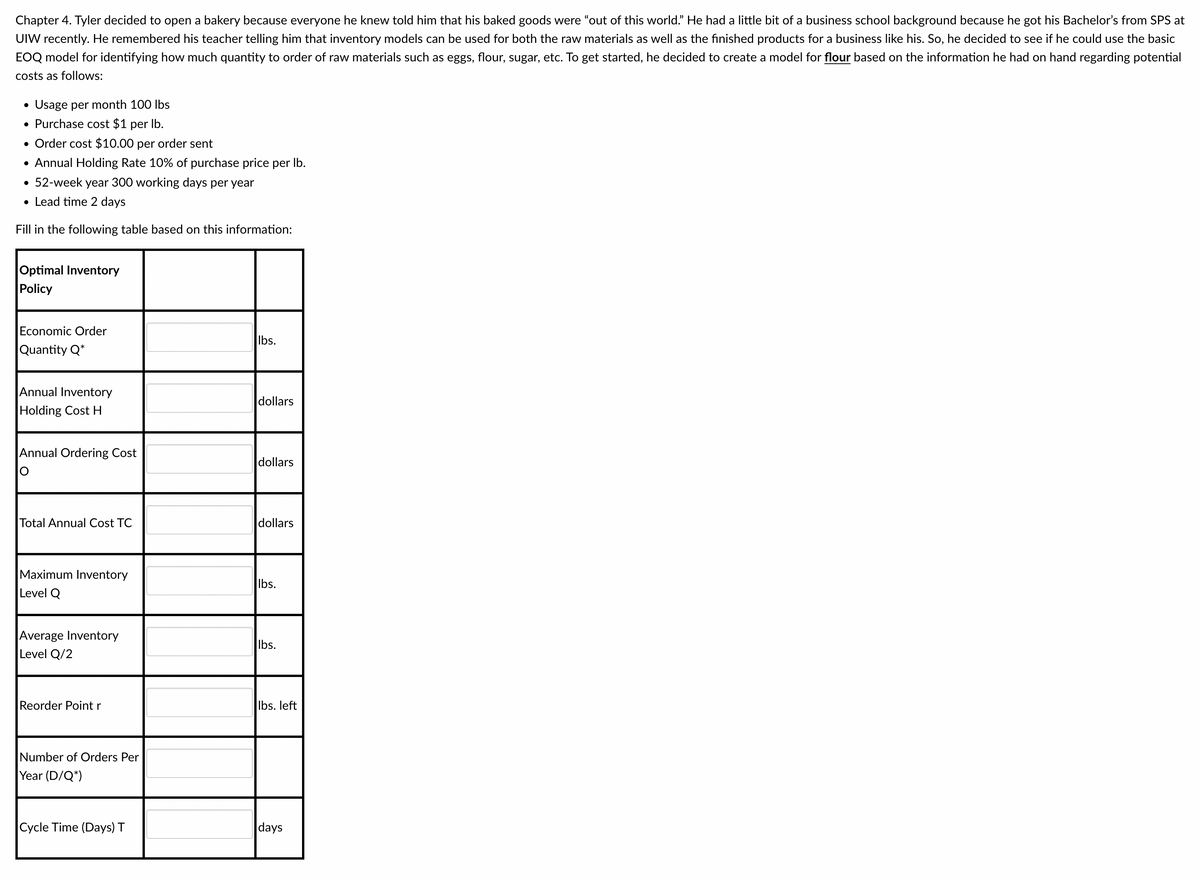Chapter 4. Tyler decided to open a bakery because everyone he knew told him that his baked goods were "out of this world." He had a little bit of a business school background because he got his Bachelor's from SPS at UIW recently. He remembered his teacher telling him that inventory models can be used for both the raw materials as well as the finished products for a business like his. So, he decided to see if he could use the basic EOQ model for identifying how much quantity to order of raw materials such as eggs, flour, sugar, etc. To get started, he decided to create a model for flour based on the information he had on hand regarding potential costs as follows: • Usage per month 100 lbs • Purchase cost $1 per Ib. • Order cost $10.00 per order sent • Annual Holding Rate 10% of purchase price per Ib. • 52-week year 300 working days per year • Lead time 2 days Fill in the following table based on this information: Optimal Inventory Policy Economic Order Quantity Q Ibs. Annual Inventory dollars Holding Cost H Annual Ordering Cost dollars lo
Chapter 4. Tyler decided to open a bakery because everyone he knew told him that his baked goods were "out of this world." He had a little bit of a business school background because he got his Bachelor's from SPS at UIW recently. He remembered his teacher telling him that inventory models can be used for both the raw materials as well as the finished products for a business like his. So, he decided to see if he could use the basic EOQ model for identifying how much quantity to order of raw materials such as eggs, flour, sugar, etc. To get started, he decided to create a model for flour based on the information he had on hand regarding potential costs as follows: • Usage per month 100 lbs • Purchase cost $1 per Ib. • Order cost $10.00 per order sent • Annual Holding Rate 10% of purchase price per Ib. • 52-week year 300 working days per year • Lead time 2 days Fill in the following table based on this information: Optimal Inventory Policy Economic Order Quantity Q Ibs. Annual Inventory dollars Holding Cost H Annual Ordering Cost dollars lo
Practical Management Science
6th Edition
ISBN:9781337406659
Author:WINSTON, Wayne L.
Publisher:WINSTON, Wayne L.
Chapter10: Introduction To Simulation Modeling
Section10.4: Simulation With Built-in Excel Tools
Problem 15P
Related questions
Question
100%

Transcribed Image Text:Chapter 4. Tyler decided to open a bakery because everyone he knew told him that his baked goods were "out of this world." He had a little bit of a business school background because he got his Bachelor's from SPS at
UIW recently. He remembered his teacher telling him that inventory models can be used for both the raw materials as well as the finished products for a business like his. So, he decided to see if he could use the basic
EOQ model for identifying how much quantity to order of raw materials such as eggs, flour, sugar, etc. To get started, he decided to create a model for flour based on the information he had on hand regarding potential
costs as follows:
• Usage per month 100 lbs
• Purchase cost $1 per Ib.
• Order cost $10.00 per order sent
• Annual Holding Rate 10% of purchase price per Ib.
• 52-week year 300 working days per year
• Lead time 2 days
Fill in the following table based on this information:
Optimal Inventory
Policy
Economic Order
Ibs.
Quantity Q*
Annual Inventory
dollars
Holding Cost H
Annual Ordering Cost
dollars
Total Annual Cost TC
dollars
Maximum Inventory
Level Q
Ibs.
Average Inventory
Level Q/2
Ibs.
Reorder Point r
Ibs. left
Number of Orders Per
Year (D/Q*)
Cycle Time (Days) T
days
Expert Solution
This question has been solved!
Explore an expertly crafted, step-by-step solution for a thorough understanding of key concepts.
This is a popular solution!
Trending now
This is a popular solution!
Step by step
Solved in 2 steps

Recommended textbooks for you

Practical Management Science
Operations Management
ISBN:
9781337406659
Author:
WINSTON, Wayne L.
Publisher:
Cengage,

Practical Management Science
Operations Management
ISBN:
9781337406659
Author:
WINSTON, Wayne L.
Publisher:
Cengage,